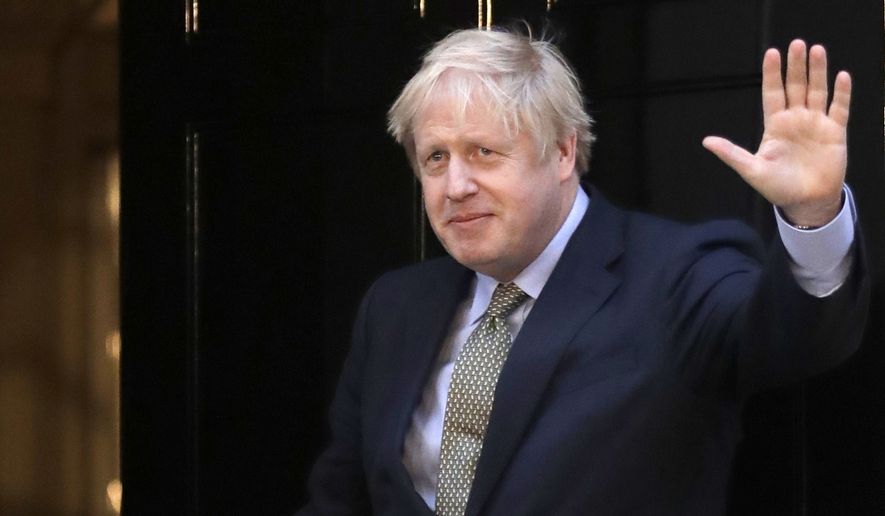OPINION:
We dodged a bullet Thursday night. While we slept, our staunchest ally chose between two paths that couldn’t be more divergent — between capitalism and Marxism, between the people vs. the elite, between self-determination and self-conscious stagnation. One thing is certain, Britain needed to move on. And our destiny and the global order is affected by this choice. We can breathe a collective sigh of relief. Bravo, Boris!
World order is more assured with the election of Boris Johnson, who has the mandate of his people to, in his campaign battle cry, “Get Brexit Done!” Beyond that, however, Britain, our closest ally, will be on course to be its own master once again. But even more significantly, America will have a partner who has the same goals: Prosperity, security and stability. Had Jeremy Corbyn ended up in Downing Street, there would have been cause for mourning.
This election also legitimizes our own path under President Trump, notwithstanding the current misguided efforts to remove him. With resounding Tory victory, Britons have embraced democracy. Three years ago, they voted in a referendum to leave the European Union. However, Parliament refused to honor their wishes. The ruling elites spurned the desires of ordinary citizens in much the same way Mr. Trump’s detractors despise the will of the electors who chose him, and will likely be even more motivated to support him to his own second election victory, after the impeachment circus concludes.
In my years of covering U.S.-U.K. affairs, I have not seen the British people, normally a very measured lot, as passionate — yes even fired up — over an election. Author Douglas Murray rightfully wished for Mr. Corbyn and Labor in the Spectator, not just: “a defeat, but a defeat of such crushing totality for the Labour party that it takes it years to recover …. What Corbyn has brought into the mainstream has toxified Britain and the party that allowed it to happen should be held to account.” Indeed, don’t mess with the Brits’ political will and their sovereignty. Or ours.
Many in British politics and media have been calling this the election of a lifetime, not just because of Brexit stagnation, but because Mr. Johnson’s opponents wanted to turn their back on Britain’s incredible economic turnaround, skillfully orchestrated by Margaret Thatcher in the 1980s.
Had Mr. Corbyn won, Britain’s global competitiveness, its financial markets, and its national security would have been compromised significantly. Mr. Corbyn’s plans to spend billions to nationalize industry and punish high-earners and corporations would likely have bankrupted the economy, much like the equally-misguided agendas of Elizabeth Warren and Bernie Sanders.
The U.K. Telegraph said it very well in its pre-election endorsement of the Conservative Party: “Labour wants to change the direction of the country from a modern, capitalist nation with free enterprise, backed by a mature welfare system, to a Marxist, high-taxing, centralised state that would drag the country to economic disaster.”
Instead, in an early Christmas present, U.K. voters have given their nation and their global partners hope for a much more positive future. Instead of a leader who espouses an isolationist, high tax, large government, anti-American, anti-capitalist agenda, in Mr. Johnson, the U.K. will enjoy an outward-looking, free-trade supporting, tax-cutting government head who will be an even better partner for the United States with his significant parliamentary majority, and who will in no uncertain terms bring an end to the agony and instability of Brexit stagnation.
It is no secret that, in opposition to Jeremy Corbyn, Boris Johnson has an extremely strong relationship with President Trump. After all, unlike President Obama and his “back of the queue” threats to Brexit, Mr. Trump has consistently expressed support for it, proclaiming Brexit a “blessing to the world” and that the will of the British people to leave the EU was a “tremendous asset, not a liability.”
Moreover, throughout his tenure, Mr. Trump has consistently expressed his commitment to a U.S.-U.K free trade agreement such as when remarked on a recent visit to the U,K.: “As the U.K. makes preparations to exit the European Union, the United States is committed to a phenomenal trade deal between the U.S. and the U.K. There is tremendous potential in that trade deal — I say probably two and even three times of what we are doing right now.”
It is gross understatement to say that the new Johnson administration, fortified by a significant parliamentary majority, will be a far better U.S. partner than socialist Corbyn, who has cozied up to some of the most nefarious enemies of the West. In Boris Johnson, we have a partner, actually born in the USA (New York), who understands the ties that bind our two countries — the critical economic, trade and intelligence components, as well as the shared values and mutual admiration of our respective cultures.
Strong allies need strong partners. Just like in our own divided country, polarized factions in the U.K. mean dangerous distraction from the business of governing. Now undeterred, Mr. Johnson will be able to fulfill the will of the British people to move forward. In Thursday’s election, British voters have finally endowed a leader to seize the moment to, dare I say it, make Britain great again.
Conrad Black recently wrote that a “Johnson–Trump relationship could, in some respects and with much-evolved styles, re-create the immensely successful cooperation of the Roosevelt–Churchill alliance that won the Second World War and the Reagan–Thatcher alliance that won the Cold War.” Interestingly, today many of the threats to our way of life come from internal rather than external enemies of freedom. After Thursday’s election, the potential for success of the Trump-Johnson alliance to address these challenges has increased decisively.
• Lee Cohen, senior fellow of the Danube Institute in Budapest and of the London Center for Policy Research in New York, served as adviser on Western Europe to the U.S. House of Representatives Foreign Affairs Committee.




Please read our comment policy before commenting.